
Well-to-do early 20th-Century White Anglo-Saxon Protestants, their less fortunate African-American fellow New Yorkers, and a gaggle of fresh-off-the-boat Eastern European immigrants collide to life-altering (and occasionally life-shattering) effect in the 1998 Tony-winning musical Ragtime, now being revived by 3-D Theatricals in a production that would do any Broadway theater proud.
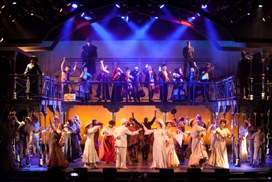 Based on E. L. Doctorow’s 1975 novel, with Tony-winning book by Terrence McNally and Tony-winning score by Lynn Ahrens and Stephen Flaherty, Ragtime takes us back a century to a time of historic change in the United States, a time when the country found itself divided between The Haves (the super-rich like Henry Ford and J.P. Morgan, both of whom are supporting characters in Ragtime) and The Have-Nots (blacks and newly arrived immigrants).
Based on E. L. Doctorow’s 1975 novel, with Tony-winning book by Terrence McNally and Tony-winning score by Lynn Ahrens and Stephen Flaherty, Ragtime takes us back a century to a time of historic change in the United States, a time when the country found itself divided between The Haves (the super-rich like Henry Ford and J.P. Morgan, both of whom are supporting characters in Ragtime) and The Have-Nots (blacks and newly arrived immigrants).
The Haves may have wanted to believe, as they harmonize in Ragtime’s opening number, that “there were no Negroes and there were no immigrants,” but Ragtime’s fictional Mother, Father, Younger Brother, and Little Boy were soon to find out otherwise.
Mother (Christanna Rowader) takes in an African-American baby found in her garden along with the child’s unwed mother Sarah (Daebreon Poiema). Younger brother (Tyler Miclean) becomes inspired by anarchist Emma Goldman (Jean Kauffman) to revolt against the status quo, and not long afterwards joins Sarah’s lover, musician Coalhouse Walker, Jr. (Rufus Bonds, Jr.), in the forced takeover of the Morgan Library. And Mother’s life eventually becomes intertwined with those of immigrant Tateh (Gary Patent) and his young daughter Little Girl (Brooke Besikoff) in addition to those already present in her own: Father (Craig McEldowney), Grandfather (Doug Carfrae), and Little Boy (Donovan McFann).
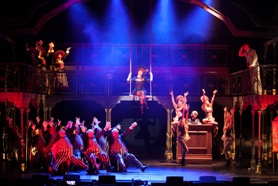 Ragtime manages to be both epic in its power ballads and cast of well-known historical figures like Ford (Robert Yacko), Morgan (John McCool Bowers), Harry Houdini (Gary Brintz), Evelyn Nesbitt (Jeanette Dawson), Admiral Perry (Yacko), and Booker T. Washington (Jimmer Bolden), and personal in its focus on Coalhouse’s efforts to win Sarah back, on Tateh and his daughter’s first steps towards becoming Americans, and on Mother’s growing disillusionment in her marriage.
Ragtime manages to be both epic in its power ballads and cast of well-known historical figures like Ford (Robert Yacko), Morgan (John McCool Bowers), Harry Houdini (Gary Brintz), Evelyn Nesbitt (Jeanette Dawson), Admiral Perry (Yacko), and Booker T. Washington (Jimmer Bolden), and personal in its focus on Coalhouse’s efforts to win Sarah back, on Tateh and his daughter’s first steps towards becoming Americans, and on Mother’s growing disillusionment in her marriage.
If all these plot threads seem daunting in synopsis, McNally’s book (and the finely delineated performances of an all-around superb 3DT cast) make each thread surprisingly easy to follow, just one of the reasons Ragtime remains well worth reviving eighteen years after its Broadway premiere.
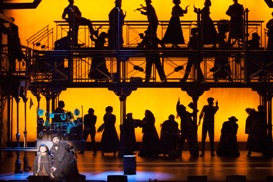 More significant is the light Ragtime shines on a) where we were vis-à-vis class-and-race relations a century ago, b) how far we have come since then, and c) how far we as a nation have yet to go.
More significant is the light Ragtime shines on a) where we were vis-à-vis class-and-race relations a century ago, b) how far we have come since then, and c) how far we as a nation have yet to go.
That Ragtime does this with gorgeous songs performed by multifaceted characters in a great big musical package told with bona fide Broadway flair makes it more than just your average everyday blockbuster (though blockbuster indeed it is) and a must-see addition to any theatergoer’s October/November calendar.
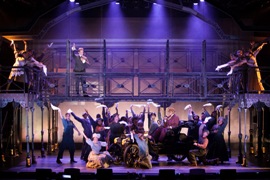 The original Broadway production featured a cast of fifty, just four more than fill the Plummer Auditorium stage in 3-D Theatricals’ biggest—and one of its absolute finest—productions to date.
The original Broadway production featured a cast of fifty, just four more than fill the Plummer Auditorium stage in 3-D Theatricals’ biggest—and one of its absolute finest—productions to date.
Spectacle Ragtime has in abundance, thanks to full-cast numbers like the rousing show-opening title song, the electrifying “Till We Reach That Day,” and the grand finale reprise of “Wheels Of Your Dream,” all of them sung quite magnificently indeed under the impeccable musical direction of Julie Lamoureux, conducting the production’s Broadway-size/caliber 19-piece pit orchestra provided by Los Angeles Musicians Collective.
Still, inspired as director T.J. Dawson’s and choreographer Dana Solimando’s staging of these major production numbers is, it is the brilliantly rich performances Dawson has elicited from his six leading players that make this Ragtime a particular standout.
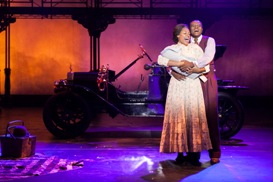 Bonds’ Coalhouse surpasses his Ovation-winning performance in Parade, his powerful star turn anchoring the production as does the revelatory work being done by an incandescent Rowader as Mother, each one stopping the show again and again, and never more so than in Rowader’s extraordinarily stirring “Back To Before.”
Bonds’ Coalhouse surpasses his Ovation-winning performance in Parade, his powerful star turn anchoring the production as does the revelatory work being done by an incandescent Rowader as Mother, each one stopping the show again and again, and never more so than in Rowader’s extraordinarily stirring “Back To Before.”
Poiema may well possess the most glorious soprano since Audra McDonald first sang “Your Daddy’s Son” on Broadway, and her duet of “Sarah Brown Eyes” opposite Bonds is simply sublime, as is her acting.
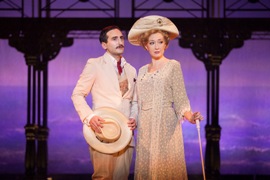 Patent’s beautifully shaded, deeply felt Tateh is as Tateh-rrfic as Tatehs get, and no wonder, given the actor’s Best Lead Actor Scenie as The Immigrant in the musical of the same name.
Patent’s beautifully shaded, deeply felt Tateh is as Tateh-rrfic as Tatehs get, and no wonder, given the actor’s Best Lead Actor Scenie as The Immigrant in the musical of the same name.
USC student Miclean, already a Scenie-winning lead actor for Grand Hotel earlier this year, continues to impress both with Broadway caliber pipes and first-rate acting chops as the impetuous Younger Brother.
As for McEldowney’s Father, with over half-a-dozen starring roles under his belt in just over a year (and a Best Featured Actor straight-play Scenie to boot), the golden-throated leading man gets his most prominent role to date and performs it to perfection, warts and all.
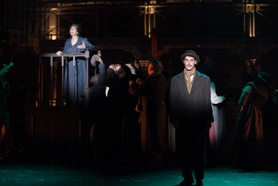 Supporting turns are all-around splendid as well: Besikof’s spunky Little Girl, Bolden’s towering Booker T., Brintz’s charismatic Houdini, Dawson’s oomphy Evelyn, Kauffman’s feisty Emma, McFann’s precocious Little Boy, and William Shaffner’s hiss-worthy volunteer fire chief Willie Conklin. Ensemble members Bowers, Carfrae, Tracy Rowe Mutz (Brigit), and Yacko are terrific too in their cameos and other tracks. As for Sarah’s Friend Willie Mae, Amber J. Snead solos her “Till We Reach That Day” with epic gospel proportions.
Supporting turns are all-around splendid as well: Besikof’s spunky Little Girl, Bolden’s towering Booker T., Brintz’s charismatic Houdini, Dawson’s oomphy Evelyn, Kauffman’s feisty Emma, McFann’s precocious Little Boy, and William Shaffner’s hiss-worthy volunteer fire chief Willie Conklin. Ensemble members Bowers, Carfrae, Tracy Rowe Mutz (Brigit), and Yacko are terrific too in their cameos and other tracks. As for Sarah’s Friend Willie Mae, Amber J. Snead solos her “Till We Reach That Day” with epic gospel proportions.
Additional vocal highlights include Dawson’s and Miclean’s sassy “Crime Of The Century” (wheeee!), Patent’s jaunty “Buffalo Nickel Photoplay Inc.” and his lilting “Gliding,” Rowader’s and Patent’s touching “Our Children,” and Kaufman’s stirring “The Night That Goldman Spoke At Union Square” and “He Wanted To Say.”
The exquisite “New Music” blends the voices of McEldowney, Roawader, Miclean, Bonds, and Poiema to perfection, while, in a lighter vein, the baseball-inspired “What A Game” provides welcome comic relief in an increasingly dark Act Two.
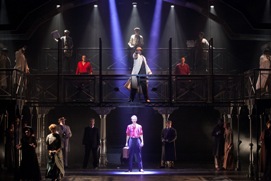 The Ragtime ensemble is huge and hugely talented. In addition to those already mentioned, Nick Adorno, Marliss Amiea, Brandon Armstrong, Patrick Batiste, Remmie Bourgeois, Brandon Burks, James Campbell, Matthew Carvin, Michael Coleman, Chanel Edwards-Frédérick, Desiree Gillespie, Jenna Gillespie, Devon Hadsell, Joshua Hamilton, Jimmy Hippenstiel, Melinda Koen, David Lynn, Melanie Mockobey, Julie Morgentaler, Dino Nicandros, Sharie Nitkin, Brandon Pohl, Kirklyn Robinson, Natalie Sachse, Kim Taylor, Christine Tucker, and Josh Wise all deserve major kudos for their stellar work in multiple tracks, and 2-year-old Kingson Higgins pops up in the show finale to audience delight.
The Ragtime ensemble is huge and hugely talented. In addition to those already mentioned, Nick Adorno, Marliss Amiea, Brandon Armstrong, Patrick Batiste, Remmie Bourgeois, Brandon Burks, James Campbell, Matthew Carvin, Michael Coleman, Chanel Edwards-Frédérick, Desiree Gillespie, Jenna Gillespie, Devon Hadsell, Joshua Hamilton, Jimmy Hippenstiel, Melinda Koen, David Lynn, Melanie Mockobey, Julie Morgentaler, Dino Nicandros, Sharie Nitkin, Brandon Pohl, Kirklyn Robinson, Natalie Sachse, Kim Taylor, Christine Tucker, and Josh Wise all deserve major kudos for their stellar work in multiple tracks, and 2-year-old Kingson Higgins pops up in the show finale to audience delight.
Best Choreographer Scenie winner Solimando finds as many ways as possible to get all of the above a-marchin’ and a-cakewalkin’ and a-doin’ the ragtime rag in what isn’t by nature a particularly dancy show.
Sound designer Julie Ferrin makes the most of the Plummer Auditorium sound system and only a few overly miked (or perhaps too loudly delivered) lines marred the performance reviewed.
Ragtime looks as fabulous as can be thanks to costumes by Networks and sets provided by Fullerton and Citrus Colleges with additional scenic design by Chris Beyries, all of this lit to dazzling perfection by Jean-Yves Tessier.
Cliff and Kat Senior’s wigs, Gretchen Morales and Melanie Cavaness’s properties, Karen Fix Curry’s costume coordination, and Jeffrey S. Marsh’s pyrotechnic design prove that it does indeed take a village to make a Ragtime.
Nicole Wessel is production stage manager and David Jordan Nestor assistant stage manager.
Even in a year that has featured Best Production Scenie winners The Producers and Damn Yankees, T.J. Dawson’s Ragtime proves in a class quite by itself. Both epic and intimate, it brings 3D Theatricals’ 2014 season to a spectacular finish.
Plummer Auditorium, 210 E. Chapman Ave., Fullerton.
www.3dtshows.com
–Steven Stanley
October 12, 2014
Photos: Isaac James Creative
Tags: 3-D Theatricals, Ahrens & Flaherty, E.L. Doctorow, Orange County Theater Review, Terrence McNally



 Since 2007, Steven Stanley's StageSceneLA.com has spotlighted the best in Southern California theater via reviews, interviews, and its annual StageSceneLA Scenies.
Since 2007, Steven Stanley's StageSceneLA.com has spotlighted the best in Southern California theater via reviews, interviews, and its annual StageSceneLA Scenies.







 COPYRIGHT 2025 STEVEN STANLEY :: DESIGN BY
COPYRIGHT 2025 STEVEN STANLEY :: DESIGN BY